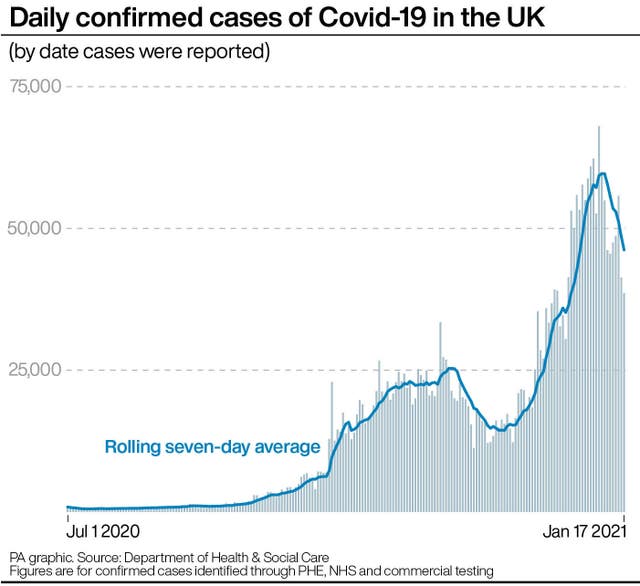All UK adults to be offered coronavirus vaccine by September, Raab says
More than 3.5 million people in the UK have now received their first dose of a vaccine.

Every adult in the UK will be offered a first dose of a coronavirus vaccine by September, Dominic Raab has pledged.
The Foreign Secretary said it would be “great” if the rollout could be faster but that the Government was working to the early autumn target.
He told Sky’s Sophy Ridge on Sunday: “Our target is by September to have offered all the adult population a first dose. If we can do it faster than that, great, but that’s the roadmap.”
Mr Raab’s pledge came amid dire warnings about the “extreme pressure” on the NHS – as it was revealed a coronavirus patient is admitted to hospital “every thirty seconds”.
NHS England chief executive Sir Simon Stevens said: “Since Christmas Day we’ve seen another 15,000 increase in the in-patients in hospitals across England, that’s the equivalent of filling 30 hospitals full of coronavirus patients.
“Staggeringly, every thirty seconds across England another patient is being admitted to hospital with coronavirus.”
However, Sir Simon said the NHS in England is vaccinating at a rate of “140 jabs a minute” and will start testing 24/7 vaccinations in some hospitals in the next 10 days.
More than 3.5 million people in the UK have now received their first dose of a vaccine and some 324,000 doses of coronavirus vaccines were administered in the space of 24 hours.
Mr Raab said the Government hoped that 88% of those most at risk of dying from coronavirus would receive their first jab by the middle of February – with 99% by the early spring.

After then, he suggested, lockdown restrictions could be gradually eased – with a possible return to the tiered system.
“I think it is fair to say it won’t be a big bang, if you like, it will be done phased, possibly back through the tiered approach that we had before,” he told BBC One’s The Andrew Marr Show.
When pressed on whether there would be enough vaccine supply for someone to get their second dose within 12 weeks, he said “we ought to” be able to deliver.
Leading epidemiologist Professor Azra Ghani said a combination of low case numbers and having vaccinated the most vulnerable would be needed before restrictions could be eased.
She told Sky: “Really, we want to get back to the situation we were in the summer with relatively low case numbers compared to now, so that we can actually test and trace and reduce onward infections.
“At the same time we’re, of course, rolling out a vaccine, that’s something we haven’t had up until now and that vaccine rollout is going very well.
“That will hopefully protect those that are most vulnerable to the severe consequences of this disease.
“We’ll need to get a balance of these two things in place before we can start to lift restrictions and it’s very difficult to say exactly when that will be.”
In other developments:
– Mr Raab dismissed claims the Government was “too slow” in setting up border measures to prevent the importation of new coronavirus variants and said ministers keep all “potential measures” under review when asked whether quarantine hotels were under consideration.
– The Foreign Secretary said people should not be going on holiday, and that any travel – domestic or international – should be for the “limited exceptional reasons” that have been spelt out.
– Another 671 deaths of people who died within 28 days of testing positive for Covid-19 were reported on Sunday, while there were a further 38,598 lab-confirmed cases of coronavirus in the UK.
– More than 3.8 million people have received their first dose of a coronavirus vaccine after almost 300,000 doses were administered on Saturday, according to Government data.
– Half of all over-80s have been vaccinated against coronavirus, Health Secretary Matt Hancock said.
– Former Sunday People editor Bridget Rowe died aged 70 after contracting coronavirus in hospital.





